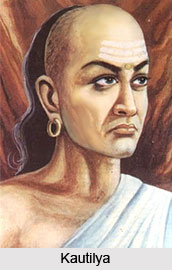 Contract theory of state advocated by Kautilya says that in return of taxes paid by the people the king guaranteed social welfare. This theory is propounded in connection with the denial of the Brahman`s claim to social supremacy. According to it in an anarchic state people elected Manu Vaivasvata as their king and agreed to pay 1/6 of their grain and 1/10 of their articles. In return of taxes the king guaranteed social welfare to the people. Even the inhabitants of the forest had to pay him 1/6 of the forest produce.
Contract theory of state advocated by Kautilya says that in return of taxes paid by the people the king guaranteed social welfare. This theory is propounded in connection with the denial of the Brahman`s claim to social supremacy. According to it in an anarchic state people elected Manu Vaivasvata as their king and agreed to pay 1/6 of their grain and 1/10 of their articles. In return of taxes the king guaranteed social welfare to the people. Even the inhabitants of the forest had to pay him 1/6 of the forest produce.
This account of the state closes with the moral that the king, who gives security and well-being to his people through eliminating wicked acts, should not be disregarded. Shanti Parva of the epic Mahabharata has theories of both social and political contract. It states that in ancient days when anarchy was extensive, people made an agreement among themselves. They decided to abandon those who speaks a lot, is cruel in acts, intrudes on other`s property and violates chastity of women. This was a social agreement to maintain family and property.
However Kautilya`s theory has the element of election. The first clear and developed exposition of contract theory is mentioned in the Buddhist canonical text Digha Nikaya.
Here it has been said that there was a time when people were perfect, and lived in a state of happiness. Ultimately the pristine purity declined, heavenly life degenerated into earthly life. Shelter, food and drink were required. People entered into a series of agreements among themselves and set up the family institutions and property. This gave rise to a new set of problems as there appeared theft and anti social activities. People assembled and agreed to choose a leader who could guarantee their life and property and in return agreed to donate a portion of their paddy.
Thus the idea of protection in lieu of taxation existed in the Brahmanical circles of pre-Mauryan period too.
This article is a stub. You can enrich by adding more information to it. Send your Write Up to content@indianetzone.com



















